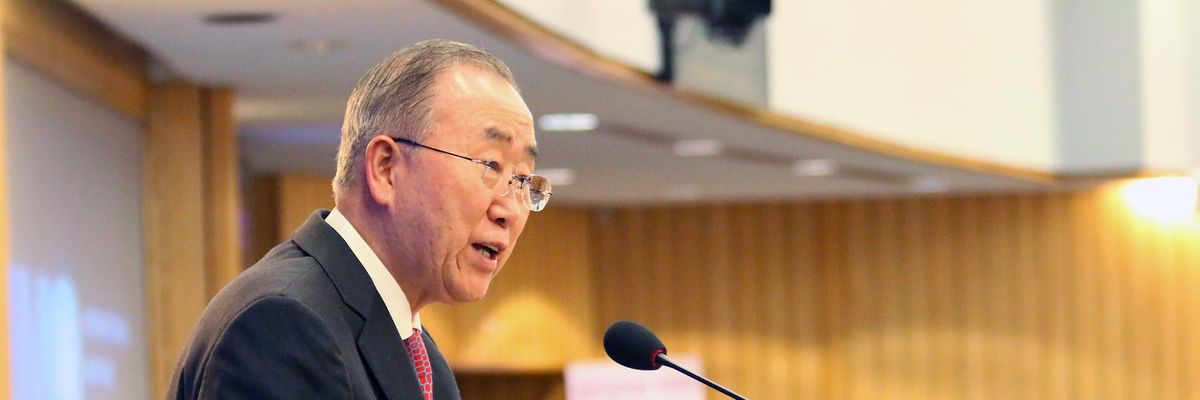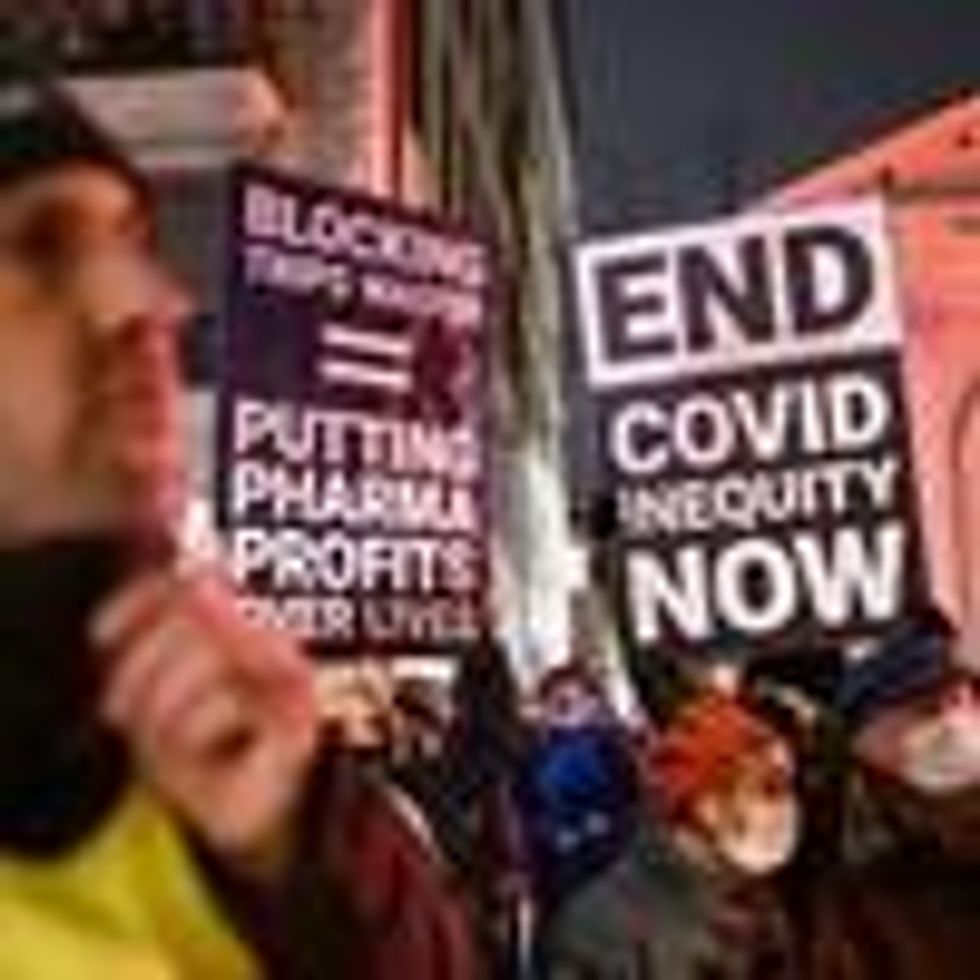The former head of the United Nations penned an op-ed in one of India's largest daily newspapers on Thursday demanding the rejection of a compromise patent waiver that would leave major barriers in the way of equitable global access to coronavirus vaccines, test kits, and therapeutics.
"The Global South will not accept half-measures when our lives are on the line."
"In fact, it is barely a waiver at all, with elements of the intellectual property agreement actively reinforced," argued Ban Ki-moon, a prominent climate and human rights advocate who served as U.N. secretary-general from 2007 to 2016. "The result is a compromise that will do little to improve access to vaccines and treatments."
Ban stressed that the stakes of waiver talks are immense, given that the coronavirus continues to spread globally and take more than 6,500 lives each day.
"By demanding more than this inadequate compromise, [Indian] Prime Minister Modi and [South African] President Ramaphosa will send a powerful message that the Global South will not accept half-measures when our lives are on the line," he wrote in The Times of India. "And they can build on the remarkable progress that has been made so far to work towards a genuine solution to this crisis; a full waiver of intellectual property rules on Covid-related technologies."
"The prize could be remarkable," Ban added. "Millions of lives could be saved. The pandemic could be brought to an end. A new lease of life could be injected into vibrant pharmaceutical sectors in India and across the Global South. We could finally deliver a people's vaccine, made by capable manufacturers around the world, and accessible to everyone, everywhere."
In October 2020, just months into the deadly Covid-19 pandemic, India teamed up with South Africa to propose a sweeping waiver that would suspend coronavirus-related patent protections for the duration of the crisis, paving the way for developing countries to manufacture vaccines and treatments on their own soil.
But for nearly a year and a half, rich European Union countries--facing aggressive lobbying from the pharmaceutical industry--hamstrung negotiations over the proposed waiver at the World Trade Organization (WTO), delaying action on patents even as the coronavirus killed millions.
The United States, which endorsed a waiver last May, was accused of emboldening opponents of the India-South Africa proposal by taking a passive approach to WTO talks.
After months of zero discernible progress, news broke last week that South Africa, India, the U.S., and the leadership of the E.U. had reached a compromise, prompting the head of the WTO and others to declare a "breakthrough" in the long-stagnant waiver negotiations.
But vaccine equity advocates and expert observers were far less sanguine about the reported deal, the details of which are still being ironed out. The compromise is believed to be significantly weaker than India and South Africa's original proposal, completely excluding coronavirus test kits and treatments.
Critics also warned that, as currently constructed, the compromise proposal would not meaningfully expand access to vaccines, which still remain out of reach for billions of people in low-income countries across the globe.
Related Content
Top Economists and Oxfam Leader Demand Truly Just Covid IP Waiver
Jessica Corbett
The U.S.-based consumer advocacy organization Public Citizen said in a statement last week that the draft proposal "would actually impose new barriers on countries attempting to remove intellectual property barriers and increase Covid medicines production."
"The E.U. and U.S. must return to negotiations with a new resolve."
"Instead of waiving barriers, it clarifies existing WTO rules, with some 'clarifications' of existing rules creating new hoops for countries to jump through, for example a new obligation to identify all patents covered by a waiver application," the group noted.
Public Citizen also stressed that the compromise plan "applies only to 'developing countries' that 'exported [less than] 10%' of the world's vaccines in 2021 (so appears to exclude China and Brazil)."
"It may also inadvertently exclude least developed countries," Public Citizen added.
Moon echoed that critique in his op-ed on Thursday, writing that the compromise is "too narrow in scope, excluding certain countries and covering only vaccines, ignoring the urgent need for other coronavirus treatments."
"Worse still, rather than smooth the path for low and middle-income countries to begin manufacturing, it adds even greater restrictions," he continued. "It would fundamentally change Indian patent law, requiring the near-impossible task of identifying and listing every patent in a vaccine, many of which are not even in the public domain."
Ban called on India and South Africa to immediately "reject this deal and insist on a better one."
"The E.U. and U.S. must return to negotiations with a new resolve, to secure the right of the Global South to produce Covid-related technologies," he wrote. "Only then will we restore faith in multilateralism and make meaningful progress towards ending the pandemic."


